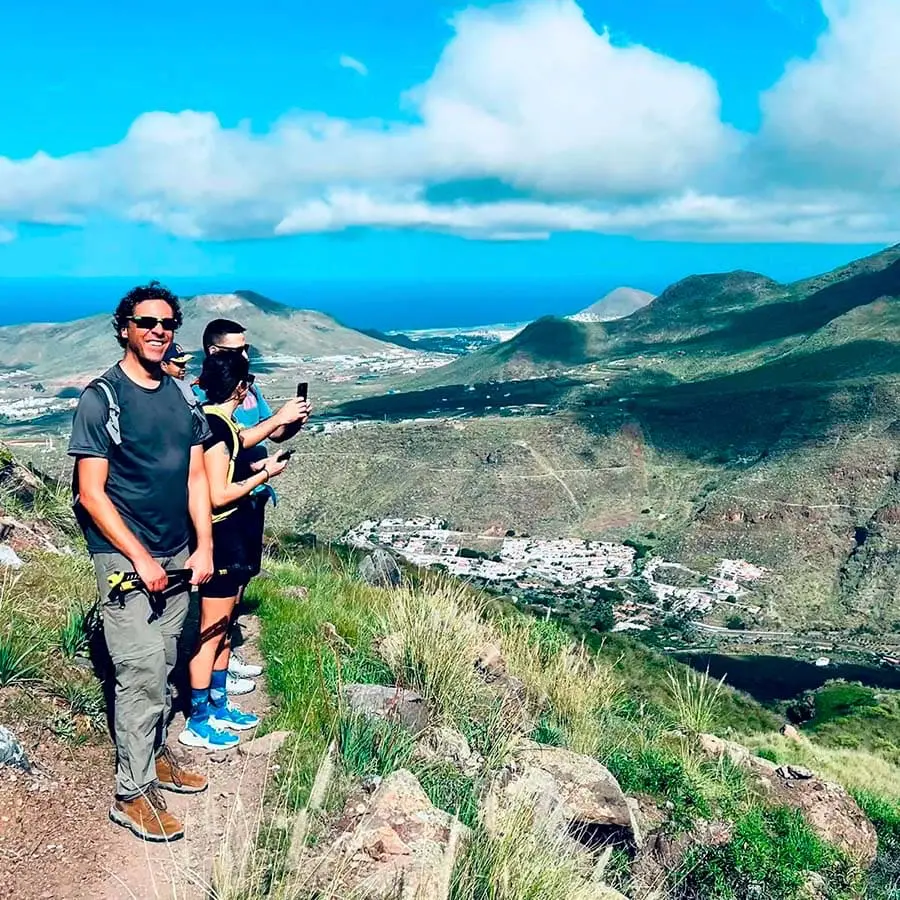Since 2016 I keep coming every winter to Gran Canaria. The island now feels like a second home to me. Almost always I stay and work at Repeople, the first and largest provider of coworking and coliving here. Sometimes I stay in Las Palmas, sometimes in Maspalomas – where Repeople offered “pop-up colivings” in 2020 and 2021. And now in winter 2022/2023 I stayed in Agaete.
Why always Repeople? Because I feel comfortable here, know other regular guests and keep getting to know nice and interesting new people. And as a location-independent freelancer (urban planning and copywriting – and occasionally journalism) I can also perfectly work here of course.
From a small scene to 47,000 remote workers on average in Gran Canaria
Well I guess I don’t need to explain to readers of this blog what the benefits of remote work are, why Gran Canaria and Repeople are the right choice, place and provider of coliving and coworking services. (And if you’re wondering why exactly Agaete is the place to be, read the blog post of my esteemed, regular coliver Sara Picazo.) But after six years as a regular at Gran Canaria and at Repeople, I’d like to share my observation of how coliving and coworking has changed throughout these years – and it DID change significantly.
On the one hand, the range of coworking and coliving spaces offered at Gran Canaria has become ever larger and more differentiated. On the other hand, this also applies to the community of “teleworkers”. When I came to Gran Canaria for the first Nomad City conference in 2016, the scene was still quite small and young. At that time you could find maybe a few hundred “digital nomads” on the Canary Islands who worked in internet cafes (yes, they used to exist!), on the stationary computers of their surf hostels or in the very few co-working spaces.
One of the first was Repeople’s Coworking Canary Islands (CWC) in Las Palmas – and it came about more by chance than strategy: 2014 two Norwegian surfers on their way from Alcaravaneras Beach to Las Canteras Beach decided to quickly check their emails. They simply entered a glass office on Calle Montevideo where they had spotted computers and politely asked the office workers to use a computer: it was the office of a photovoltaic supplier which belonged to one of the later founders of Repeople. CWC and Repeople were born.
Today there are almost 20 coworking spaces from different providers with different concepts in Las Palmas alone. Repeople’s first coliving “The Roof” has been followed by seven others to date. In addition, there are the colivings of other providers and of course countless hostels, hotels or AirBnB or private apartments, which are often also used by remote workers. Slowly but surely these services emerged also outside of Las Palmas and also on the other Canary Islands.
Now the regional government of the Canary Islands estimates the number of remote workers at tens of thousands, citing the platform Nomad List. The Corona pandemic clearly was a booster: In 2021, Nomad List numbered around 47,000 remote workers on the Canaries. In the year 2022, which has just ended, this number will be exceeded. From a view hundred to ten thousands within 5-6 years!
The Corona pandemic was a disrupter and has changed a lot – also in the world of work. In my home country Germany, where staying in the office for as long as possible was almost considered a proof of diligence and productivity, employers were suddenly required by law to allow their employees to work from home for reasons of pandemic protection. In many other countries the home office suddenly became possible, too. In other countries, a development that was already ongoing was accelerated somewhat. Working from home is now considered the “new normal”.
Have digital nomads changed over the years?
And the step from working in your office at home (aka living room, kitchen, attic…) to work from your “home office” away from home is a small one. For most jobs in the corporate world, it’s only relevant for insurance reasons (if at all) whether the employees work in their living room in the suburbs – or in a coworking on the Canary Islands.
What I noticed in the coliving spaces and at meetups five years ago, there were mainly young freelancers who had just graduated from university. They often were making a stopover at Las Palmas on their trip around the world to the hotspots of backpackers and digital nomads like Chiang Mai, Bogota and Cape Town.
Now a few years later I increasingly meet “adult” remote workers, especially in winter time (from a northern German perspective I simply call this time of year “50 Shades of Grey”). More and more employees and entrepreneurs between 40 and 60 are showing up in the community. These people have their jobs as bankers, business development managers, program managers at universities in Europe or North America. And they live there but they escape the winter for a few weeks to work in a sunny home office away from home. Then they fly back home to Frankfurt or Indianapolis instead of Thailand.
If I were to write a master’s thesis on the development of remote work, this would be my hypothesis: backpackers became digital nomads and eventually remote workers. Or even more pointedly: remote work is growing up. Fortunately, this is not a master’s thesis. Because at every meetup in the Las Canteras area and every barbecue evening at The Roof my hypothesis gets immediately refuted: the young coders, online marketers, dropshippers, youtubers and virtual assistants are still there of course. But the community has become significantly larger and more diverse. The range of people has grown and so does the demand and the offer.

El Cabo Coliving in Agaete: the place to be for digital nomads and remote workers
Now, in addition to the “classic shared flat” (e.g. The Roof or The Mansion) with its large communal areas, there are also units with several independent apartments giving you more privacy but with communal areas as an add-on (such as The Founders).
And there is now Repeople’s highly recommended new coliving and coworking “El Cabo” in Agaete in a former hotel with 31 rooms – and the huge roof area and other common areas so typical of Repeople. All embedded in the spectacular landscape of the north coast with its dramatic cliffs (I refer again to Sara Picazo’s blog post).
Everything here is much quieter and more laid back than in the hustle and bustle of Las Palmas. An ideal setting for large groups, for example for company retreats – and yet another new offer that fits in with the transformation and diversification of remote work.






